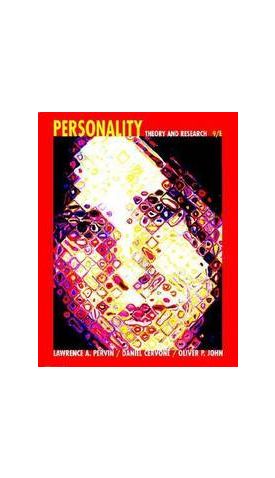Preface vii
1 Personality Theory: From Observation to Scientific Explanation 1
Defining Personality, 4
Three Goals for the Personality Theorist, 6
Answering Questions about Persons Scientifically: Understanding Structures, Processes, Development, and Therapeutic Change, 10
Important Issues in Personality Theory, 17
Evaluating Personality Theories, 23
The Personality Theories: An Introduction, 24
Major Concepts, 28
Review, 28
2 The Scientific Study of People 29
Personality Research: The Data, 31
Personality Research: Research Designs, 35
Contemporary Developments in Personality Research: Social Media and Language-Based Assessments, 45
Personality Assessment and the Case of Jim, 48
Vive la Différence: Conceptual Distinctions in Personality Research, 49
Major Concepts, 56
Review, 56
3 A Psychodynamic Theory: Freud's Psychoanalytic Theory of Personality 57
Sigmund Freud (1856-1939): A View of the Theorist, 58
Freud's View of the Person, 60
Freud's View of the Science of Personality, 63
Freud's Psychoanalytic Theory of Personality, 64
Major Concepts, 87
Review, 87
4 Freud's Psychoanalytic Theory: Applications, Related Theoretical Conceptions, and Contemporary Research 89
Psychodynamic Personality Assessment: Projective Tests, 90
Psychopathology, 96
Psychological Change, 99
The Case of Jim, 104
Related Theoretical Conceptions, 107
Contemporary Developments in Personality Theory: Neuropsychoanalysis, 122
Critical Evaluation, 127
Major Concepts, 131
Review, 131
5 A Phenomenological Theory: The Personality Theory of Rogers 133
Carl R. Rogers (1902-1987): A View of the Theorist, 135
Rogers's View of the Person, 137
Rogers's View of the Science of Personality, 139
The Personality Theory of Carl Rogers, 140
Major Concepts, 153
Review, 153
6 Rogers's Phenomenological Theory: Applications, Related Theoretical Conceptions, and Contemporary Research 154
Clinical Applications, 155
The Case of Jim, 162
Related Conceptions: Human Potential, Positive Psychology, and Existentialism, 164
Developments in Research: The Self and Authenticity, 172
Contemporary Developments in Personality Theory: Personality Systems Interaction Theory and the Integrated Self, 179
Personality Systems Interaction Theory, 180
Illustrative Research, 183
Implications for Rogers's Self Theory of Personality, 183
Critical Evaluation, 184
Major Concepts, 188
Review, 188
7 Trait Theories of Personality: Allport, Eysenck, and Cattell 189
A View of the Trait Theorists, 190
Trait Theory's View of the Person, 191
Trait Theory's View of the Science of Personality, 192
Trait Theories of Personality: Basic Perspectives Shared by Trait Theorists, 194
The Trait Theory of Gordon W. Allport (1897-1967), 195
Identifying Primary Trait Dimensions: Factor Analysis, 198
The Factor-Analytic Trait Theory of Raymond B. Cattell (1905-1998), 200
The Three-Factor Theory of Hans J. Eysenck (1916-1997), 204
Major Concepts, 212
Review, 212
8 Trait Theory: The Five-Factor Model and Contemporary Developments 214
On Taxonomies of Personality, 215
The Five-Factor Model of Personality: Research Evidence, 216
Five-Factor Theory, 226
Maybe We Missed One? The Six-Factor Model, 229
Cross-cultural Research: Are the Big Five Dimensions Universal?, 229
Contemporary Developments in Trait Theory: Reinforcement Sensitivity Theory, 234
The Case of Jim--Factor-Analytic Trait-Based Assessment, 240
The Person-Situation Controversy, 243
Critical Evaluation, 245
Major Concepts, 249
Review, 249
9 Behaviorism and The Learning Approaches To Personality 251
Behaviorism's View of the Person, 254
Behaviorism's View of the Science of Personality, 254
Watson, Pavlov, and Classical Conditioning, 258
Skinner's Theory of Operant Conditioning, 268
Critical Evaluation, 278
Major Concepts, 281
Review, 281
10 A Cognitive Theory: George A. Kelly's Personal Construct Theory of Personality 282
George A. Kelly (1905-1966): A View of the Theorist, 285
Kelly's View of the Science of Personality, 286
Kelly's View of the Person, 287
The Personality Theory of George A. Kelly, 288
Clinical Applications, 301
The Case of Jim, 304
Related Points of View and Recent Developments, 305
Critical Evaluation, 306
Major Concepts, 310
Review, 310
11 Social-Cognitive Theory: Bandura and Mischel 311
Relating Social-Cognitive Theory to Historically Prior Theories, 312
A View of the Theorists, 313
Social-Cognitive Theory's View of the Person, 316
Social-Cognitive Theory's View of the Science of Personality, 317
Social-Cognitive Theory of Personality: Structure, 317
Social-Cognitive Theory of Personality: Process, 325
Social-Cognitive Theory of Growth and Development, 329
Major Concepts, 341
Review, 341
12 Social-Cognitive Theory: Applications, Related Theoretical Conceptions, and Contemporary Developments 342
Beliefs About the Self and Self-Schemas, 344
Standards of Evaluation and Self-Discrepancies, 352
Contemporary Developments in Personality Theory: The KAPA Model, 354
Clinical Applications, 361
Stress, Coping, and Cognitive Therapy, 366
The Case of Jim, 370
Critical Evaluation, 372
Major Concepts, 375
Review, 375
13 Culture, Interpersonal Relations, and the Social Foundations of Personality and Its Development 376
Persons in Cultures, 378
Broad Cultural Differences: Western and Eastern Views of Self, 385
Societies within Cultures: Social Practices and Personality Development, 389
Personality Development in Socioeconomic Context, 393
Personality Functioning Across the Life Span, 396
Interpersonal Relationships, 398
Putting Personality in Context into Practice, 404
Summary, 409
Major Concepts, 409
Review, 409
14 Genes, Brains, and Biological Bases of Personality and its Development 411
This illustration shows the location through which an iron rod blasted through the frontal cortex of Phineas Gage--who survived the accident but experienced a profound change in his personality., 412
Temperament, 413
Evolution, Evolutionary Psychology, and Personality, 436
Mood, Emotion, and the Brain, 446
Plasticity: Biology as Both Cause and Effect, 451
Neuroscientific Investigations of "Higher-Level" Psychological Functions, 452
Summary, 453
Major Concepts, 453
Review, 453
15 Assessing Personality Theory and Research 455
The Personality Theories: Similarities, Differences, and Integration, 456
What an Integrative Theory Might Look Like, 460
How Did They Do? A Critical Evaluation of the Personality Theories and Their Research, 461
A Final Summing Up: Theories as Toolkits, 466
Review, 467
Glossary G-1
References R-1
Author Index I-1
Subject Index I-00



Login and Registration Form